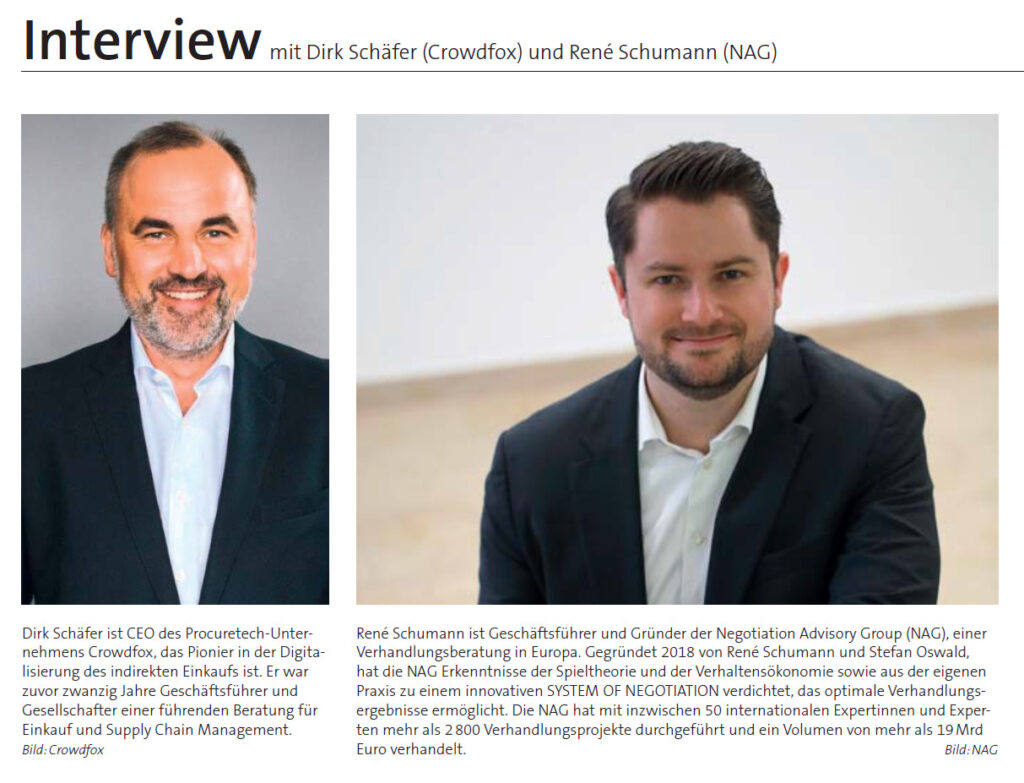Interview with Crowdfox-CEO Dirk Schäfer
The trade magazine Technik+Einkauf is besides Beschaffung aktuell and Best in Procurement one of the leading magazines for procurement and supply chain management in Germany.
In the recent publication editor-in-chief Kathrin Irmer talks with Crowdfox-CEO Dirk Schäfer and René Schumann, Managing Partner Negotiation Advisory Group, on the challenges for procurement in the future, fully automated procurement systems and of course about artificial intelligence, like ChatCFX.
Read the full interview in German here or the English translation directly below.
The Future of Procurement
The strategic challenges have changed significantly again in 2023. In the crisis years buyers had to see if they could get any materials at all, now the situation is completely different. We spoke to Dirk Schäfer (Crowdfox) and René Schumann (NAG) about which strategic measures are now in the foreground.
Mr. Schäfer, Mr. Schumann, what do you see as the strategic challenges procurement is facing today?
René Schumann: Above all it is the change in globalization that creates new challenges for procurement. Procurement nowadays is confronted with rising and highly volatile prices for energy, raw materials and primary products worldwide. The supply chains are more fragile, tensions with autocratic regimes are increasing. At the same time regulatory and ethical requirements for companies and suppliers are growing. Purchasing must therefore make strategic sourcing decisions on the basis of several criteria: Security of supply, low costs, risk minimization, access to innovation, compliance and sustainability. At the same time, it is now possible to relieve purchasing of non-strategic purchasing processes.
Dirk Schäfer: Challenges are one side. Opportunities are the other. I see great opportunities, especially at a time in which artificial intelligence is now asserting itself. It can and will help to not only make purchasing more efficient and therefore more cost-effective, especially in the indirect field. It will also make purchasing simpler and less technocratic. And therefore much more widely accepted and applicable within the company. This means for purchasing managers, on the one hand to face the strategic challenges outlined here by René Schumann. On the other hand they must now create the conditions to do so: And this can only be achieved by further digitalization of all non-strategic processes in order to free up the necessary resources.
And purchasing would then have nothing to do with the C-parts?
Dirk Schäfer: There is no way around the fact that companies need to optimize all procurement processes with low added value and less complexity to automation and digitalization. The shortage of skilled workers in particular forces them to deal with the strategically really relevant issues. That is why they must now work on more or less eliminating itself in indirect procurement. At least in regard to the operational aspects. Of course, the purchasing department still controls the processes and is responsible for the platforms used for purchasing.
But how can we guarantee that companies will get the lowest prices in the future?
Dirk Schäfer: It is not just about the price. It is about quality, availability and increasingly also about ESG-criteria. So, how do I make sure that my CO2 footprint gets smaller and not bigger? But of course the price is still probably the decisive criterion. By comparing items digitally with each other, it is possible to find the best provider for all criteria, in a completely transparent way. This works with us, for example, using AI, algorithms or semantic analysis, which is very mathematical and technical. The decision on the significance of these criteria is ultimately of course made by a human being.
Does that make price negotiations obsolete?
Dirk Schäfer: Because the number of providers and marketplaces is constantly growing, this will probably be the way forward. At least in indirect purchasing. These ‘commodities’ will price themselves through permanent transparency. Where it becomes strategic, the purchasing department will of course follow up.
So a fully automated procurement system?
Dirk Schäfer: Fully automatic – and in the future even smart. We are currently developing ChatCFX, for example, the combination of an AI-controlled chatbot and the Crowdfox transparency solution. This chatbot will not only be able to determine the best criteria described above. It will communicate with users just like a human and discuss, what they really want to order. Instead of searching for article numbers or free text you describe your problem and ChatCFX will help you individually. Right up to the final initiation of the order in the system. This is the future of indirect purchasing, so that purchasers can finally concentrate on other topics than on small-scale day-to-day business.


